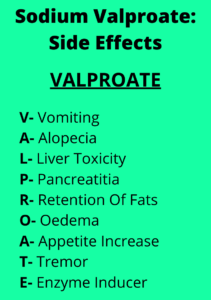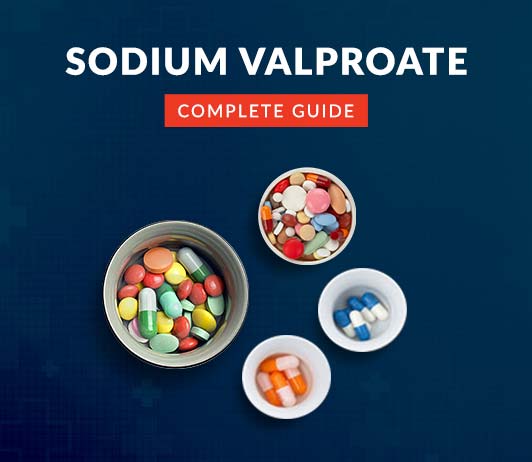This guide will provide you with information about Valproate (Depakote), including how it works, how to take it, and what side effects to expect.
Contents
Understanding Valproate (Depakote)

Valproate (Depakote) is a prescription medication used to treat various mental health conditions, such as bipolar disorder and seizures. It belongs to a class of medications called anticonvulsants.
Action Mechanism
It works by increasing the levels of gamma-aminobutyric acid (GABA), a neurotransmitter in the brain that helps to control seizure activity. Valproate (Depakote) is thought to work by stabilizing electrical activity in the brain.
How Long Does It Take To Work
Valproate (Depakote) typically begins working within a few days to weeks. However, it may take up to several months for the full effect of the medication to be seen.
Important Information About Valproate (Depakote)
- Valproate (Depakote) can cause birth defects. If you are taking this medication, it is important to use birth control to prevent pregnancy.
- You should also avoid drinking alcohol while taking Valproate (Depakote), as it can increase the risk of liver damage.
- You should also avoid operating machinery if you are feeling drowsy. As it might increase the risk of incidence of accidents.
Things I Should Tell My Doctor Before Taking Valproate (Depakote)
- Be sure to tell your doctor if you have any allergies or medical conditions, such as liver disease, kidney disease, or a history of substance abuse.
- You should also let your doctor know if you are pregnant or planning to become pregnant, as this medication can cause birth defects.
Specific Concerns About Valproate And Pregnancy
If you are breastfeeding, you should also speak to your doctor before taking Valproate, as it is not known if the medication passes into breast milk.
Administering Valproate (Depakote)

Valproate is available in tablet, capsule, and liquid form. It is typically taken two to four times daily.
How Should I Take Valproate (Depakote)
Valproate should be taken as directed by your doctor. The medication can be taken with or without food. It is important to take Valproate exactly as prescribed to prevent serious side effects.
What Should I Avoid While Taking Valproate (Depakote)
Valproate may cause drowsiness, so it is important to avoid driving or operating machinery while taking the medication. You should also avoid drinking alcohol while taking Valproate.
What Happens If I Miss A Dose of Valproate (Depakote)
If you miss a dose of Valproate, take the missed dose as soon as you remember. If it is almost time for your next dose, skip the missed dose and take the next dose at your regular time. Do not take two doses of Valproate at the same time.
What Happens If I Overdose With Valproate (Depakote)
If you think you have overdosed on Valproate, call 911 or go to the nearest emergency room immediately. Symptoms of an overdose may include drowsiness, confusion, and seizures.
Evaluating Valproate (Depakote)

Your doctor will likely check your liver function and monitor you for signs of suicide or self-harm while you are taking Valproate. The medication should not be used in children under the age of two.
Common Side-effects
The most common side effects of Valproate include:
- drowsiness,
- dizziness, and
- headache.
Other common side effects include:
- nausea,
- vomiting,
- diarrhea, and
- weight gain.
Rare/severe Side-effects
Rare or severe side effects of Valproate include:
- liver damage,
- pancreatitis, and
- low blood platelet levels.
If you experience any of these side effects, call your doctor immediately.
Risks for Taking Valproate (Depakote) For Long Periods
Valproate is a medication that carries risks if it is taken for long periods. These risks include:
- birth defects,
- liver damage, and
- pancreatitis.
If you are taking Valproate, it is important to speak with your doctor about the risks and benefits of the medication.
Withdrawal Symptoms
If you suddenly stop taking Valproate, you may experience withdrawal symptoms such as:
- anxiety,
- irritability, and
- nausea.
It is important to speak with your doctor before stopping Valproate to prevent withdrawal symptoms.
Medications That May Interact With Valproate (Depakote)
Valproate may interact with other medications, including:
- certain antibiotics,
- antifungals, and
- seizure medications.
It is important to speak with your doctor about all of the medications you are taking before starting Valproate.
Managing Side-effects of Valproate (Depakote)
If you are experiencing side effects from taking Valproate, there are a few things you can do to manage them. These include:
- drinking plenty of fluids,
- eating smaller meals more frequently, and
- avoiding high-fat foods.
NOTE: If you are experiencing severe side effects, call your doctor immediately. Do not stop taking Valproate without first speaking to your doctor.
Alternatives To Valproate (Depakote)
There are a few alternatives to Valproate, including:
- carbamazepine,
- lamotrigine, and
- phenytoin.
NOTE: Your doctor can help you decide which medication is right for you.
Conclusion
Valproate is a medication used to treat seizures, bipolar disorder, and migraines. However, it is important to speak with your doctor about the risks and benefits of taking Valproate before starting the medication. Moreover, if you have any questions about Valproate, talk to your doctor or pharmacist. They will be able to help you understand the risks and benefits of taking the medication.
A Word From Therapy Mantra
Your mental health — Your psychological, emotional, and social well-being — has an impact on every aspect of your life. Positive mental health essentially allows you to effectively deal with life’s everyday challenges.
At TherapyMantra, we have a team of therapists who provide affordable online therapy to assist you with issues such as depression, anxiety, stress, workplace Issues, addiction, relationship, OCD, LGBTQ, and PTSD. You can book a free therapy or download our free Android or iOS app.


